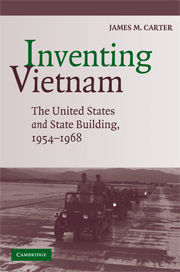Book contents
- Frontmatter
- Contents
- Acknowledgments
- 1 Introduction: Inventing Vietnam
- 2 The Cold War, Colonialism, and the Origins of the American Commitment to Vietnam, 1945–1954
- 3 “The Needs Are Enormous, the Time Short”: Michigan State University, the U.S. Operations Mission, State Building, and Vietnam
- 4 Surviving the Crises: Southern Vietnam, 1958–1960
- 5 “A Permanent Mendicant”: Southern Vietnam, 1960–1963
- 6 A Period of Shakedown: Southern Vietnam, 1963–1965
- 7 The Paradox of Construction and Destruction: Southern Vietnam, 1966–1968
- Epilogue: War, Politics, and the End in Vietnam
- Bibliography
- Index
Epilogue: War, Politics, and the End in Vietnam
Published online by Cambridge University Press: 05 June 2012
- Frontmatter
- Contents
- Acknowledgments
- 1 Introduction: Inventing Vietnam
- 2 The Cold War, Colonialism, and the Origins of the American Commitment to Vietnam, 1945–1954
- 3 “The Needs Are Enormous, the Time Short”: Michigan State University, the U.S. Operations Mission, State Building, and Vietnam
- 4 Surviving the Crises: Southern Vietnam, 1958–1960
- 5 “A Permanent Mendicant”: Southern Vietnam, 1960–1963
- 6 A Period of Shakedown: Southern Vietnam, 1963–1965
- 7 The Paradox of Construction and Destruction: Southern Vietnam, 1966–1968
- Epilogue: War, Politics, and the End in Vietnam
- Bibliography
- Index
Summary
“After 17 years of total involvement in Vietnamese internal affairs, the United States has sanctified in power a polished and ruthless military Machiavellian, heading a one-party military regime, authoritarian, institutionalized in its corruption, and lacking support among the people.” Thus Wesley Fishel made known his unabashed disapproval of U.S. policy in Vietnam in a 1971 New York Times op-ed. Fishel had, since 1962, watched uneasily as U.S. policy drifted further from what he and his fellow Michigan State University Vietnam Advisory Group (MSUG) state builders had envisioned in the late 1950s. In his view, the United States had long since failed in the most important of its objectives: building a stable, independent state infrastructure in southern Vietnam. Looking back over the nine years since the official end of his role in building the state, the political science professor subsequently told an interviewer that the United States had “undermined … the very thing we set out to help achieve” through a penchant for overusing immense power on behalf of ill-fitting solutions. As he put it, “there is an American obsession that if 100 Americans can do a job well, 10,000 can do it better.” Fishel, and his MSUG colleagues as well, had for years issued repeated disapprovals of military escalation in Vietnam.
In the early 1970s, and having endured student protests around campus for his role in the failed U.S. policies in Southeast Asia, Michigan State University's (MSU) Fishel continued to believe the problem in Vietnam was a political one that defied military solutions and that U.S. objectives could have otherwise been achieved.
- Type
- Chapter
- Information
- Inventing VietnamThe United States and State Building, 1954–1968, pp. 232 - 248Publisher: Cambridge University PressPrint publication year: 2008



